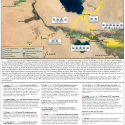 |
 |
Iraq Euphrates River Valley Activity: December 22, 2015 - March 2, 2016
Mar 2, 2016 - Patrick Martin


The Iraqi Security Forces (ISF) launched operations to retake Ramadi from ISIS on December 22 and established control of the city on February 9. The ISF will need to target remaining ISIS safe havens in the Euphrates River Valley, including Hit and Fallujah, in order to consolidate these gains. These subsequent operations will strengthen the ISF’s long-term operational abilities in Anbar while undermining ISIS’s control along a key line of communication between Iraq and Syria. The ISF will nevertheless face various challenges to clearing and controlling ISIS safe havens in western Anbar. ISIS has already responded by launching counter-attacks against the ISF’s thinly spread forces. These have included coordinated ground attacks and spectacular attacks in Anbar and Baghdad. Tying up the ISF in dispersed engagements could allow ISIS to maintain key territory, vital access points, and lines of communication while undermining the ISF’s ability to focus on counter-offensive rather than defensive operations. Second, political pressures in Baghdad and shortages of manpower will also likely precipitate the direct participation of predominantly Shi’a Popular Mobilization fighters in ongoing operations, causing real risks of sectarian violence in majority Sunni areas. Finally, ISIS retains Fallujah as a heavily fortified stronghold on the Euphrates near Baghdad and from it can launch deadly attacks into ISF-secured areas. Popular Mobilization forces, including Iranian-backed proxy groups, have spearheaded operations to encircle Fallujah, but they are aiming to isolate and besiege the city rather than recapture it. The ISF is therefore not likely to regain Fallujah in 2016.
The ISF is also preparing for the recapture of Mosul and has generated forces for that fight. Opening fronts in Anbar and Ninewah simultaneously will likely force ISIS to adopt a defensive posture, as it did in the first quarter of 2015. Ongoing ISIS counterattacks and the scope of subsequent operations in Anbar will likely challenge the ISF and delay the decisive phase of a Mosul operation.